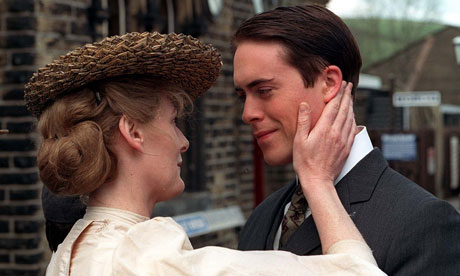
"Whatever else is unsure in this stinking dunghill of a world a mother's love is not," wrote James Joyce. If only that were so – but then what would get psychotherapists, and many novelists, out of bed in the morning? Type "mothers in literature" into Google and it helpfully gives you suggestions ranging from "bad'" mothers in literature to "worst" and "evil" (including a sub-genre of "psycho mums"), with "best" mothers trailing meekly behind. From Medea to Grendel's mother, Queen Gertrude to Gertrude Morel, Mrs Bennet to Mrs Winterson, literature is strewn with dreadful mothers somewhere on a scale from meddlesome to murderous.
And the "good" list (much shorter) isn't much cheerier. Hester Prynne, anyone? Lovely Mrs Ramsay is killed off halfway through To the Lighthouse. You wouldn't want to spend a coffee morning with gruff old Marilla Cuthbert from Anne of Green Gables. And as for sugary "Marmee" Mrs March in Little Women – give me racy Mrs Robinson any day.
It is a truism that happy stories end in a marriage and sad ones start with adultery – neither of which leaves much room for motherhood (just look at unhappy Anna Karenina). There's a reason orphans are so popular in fiction. Novels are roomy enough to house the full orchestra required for romance, passion and betrayal – but the quiet motif keeping it all together is easily drowned out. There are several contemporary novelists who are unafraid to put mothers at the heart of their work (Anne Tyler, Rachel Cusk and Jonathan Franzen spring to mind) but for the most part this is left to short story writers. Short stories are ideally suited to capturing the intimacy and intensity of the relationship between mother and child – something Everyman classics has caught on to with its very giftable new pocketbook-sized collection Stories of Motherhood. The pretty Victorian painting on the front belies the sharp edges of the stories inside – like a chocolate box of lemon sherberts – many of which are by contemporary writers, such as Lydia Davis, Anita Desai and the magisterial Alice Munro, whose work is full of mothers.
But the short story writer most famously associated with motherhood in all its messy, mundane, exhausting and exhilarating everyday details is, of course, Helen Simpson, whose 2000 collection Hey Yeah Right Get a Life, devoted entirely to tales of the tyranny of bringing up small children, was seen as spearheading what came to be, rather patronisingly, dubbed a trend for "mummylit'". For our special quartet of stories for Mother's Day, she reads "Early One Morning" from her next collection, Constitutional, which takes us inside a car full of kids and the musings on motherhood, marriage and middle age of a mum on the school run. Colm Tóibín has also dedicated an entire collection to this theme, Mothers and Sons, from which he reads "A Song", a haunting tale about a chance meeting in a pub in Clare between a long-estranged mother and her son. No one reads quite like Tóibín, even among Irish writers, and listening to Helen Simpson record her story made me cry – really.
Tessa Hadley, who read another Elizabeth Bowen story for us so magnificently, and who has written several wonderful stories of her own about being a mother, records Elizabeth Bowen's strange story "Coming Home", which draws on the child's deepest fear of something terrible happening to their mother, recording the agonising wait of an over-anxious daughter. Lorrie Moore is another short story writer who has repeatedly brought her unique combination of spiky wit and honesty to this fertile territory. Fellow midwesterner Sarah Churchwell reads Moore's characteristically funny and heartbreaking "How to Talk to Your Mother (Notes)" from one of her earliest collections, Self-Help, and reproduced in the Everyman collection, with great empathy and elan.
With the exception of "Early One Morning", which takes us in and out of the mother's thoughts, as meandering and halting as the rush-hour London traffic, the stories are told from the perspective of the child (or grown-up child), capturing the essential unknowability of that figure who knows us best. And except perhaps for the prodigal singer in "A Song", the mothers are neither angels nor monsters, simply "good-enough mothers", as DW Winnicott would have it. I hope you enjoy listening to them as much as we enjoyed recording them. Please do let us know your favourite literary matriarchs. Here's to mums – good and bad, real and fictional.

